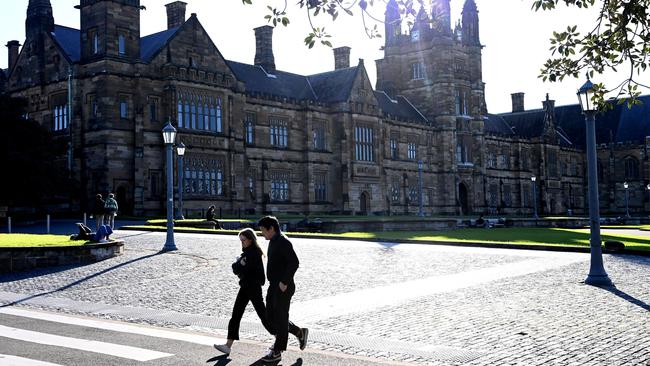Government set up inquiry into racism on university campuses
In response to heated tensions at campuses the federal government has established an inquiry into racism at universities.

An inquiry into the heated tensions on university campuses over the Israel-Gaza war will cover all kinds of racism, despite Jewish leaders and crossbench MPs calling for a more focused probe on the anti-Semitism crisis.
The inquiry, announced in the budget, will examine the prevalence and impact of anti-Semitism, Islamophobia and racism generally in universities. The government said the $1m inquiry would make recommendations to ensure a culturally safe environment for students and staff.
Pressure for the inquiry has been building from the Jewish community as instances of anti-Semitic has grown on campuses. But the inquiry is broader than some groups were seeking.
Liberal MP and senior Jewish figure Julian Leeser has called for a probe led by a senior judge into universities’ handling of anti-Semitism, and has gained the support of teal MPs.
The University of Melbourne has also been in turmoil over its chancellor Jane Hansen’s refusal to join other university leaders in saying there is a specific problem with anti-Jewish abuse on her campus, leading to a rebuke from her university council colleague and Jewish leader Mark Liebler.
Higher education reforms
The budget also sets out more details of Education Minister Jason Clare’s plan for higher education reforms following the Universities Accord review, which reported in February.
A key part of the plan, to provide a place at university for all students from disadvantaged backgrounds provided they are qualified, will begin in January 2026. This will help the government meet the Accord target of 80 per cent of working age adults having a tertiary qualification by 2050. If this target is met, the government estimates workers will earn an extra $240bn (in today’s dollars) by 2050 from their higher level of qualifications.
The government also said it would go ahead with another key Universities Accord recommendation – a needs-based funding system for higher education which will give universities more funding for students from disadvantaged backgrounds who require more resources.
Many other reforms from the Accord get the go-ahead in the budget and an implementation advisory committee to help with detailed design has been formed.
HELP loan indexed at a lower rate
From June 1, 2023, the amount graduates owe on their outstanding HELP loan will be indexed at a lower rate, estimated to save them $3bn this year.
Instead of their loans being indexed to price growth (the consumer price index), they will be indexed to the lower of the price or wage growth (the wage price index) in any particular year.
This makes a big difference when price inflation shoots ahead of wage inflation, as it has this year. A student with the average HELP debt of $26,500 will save about $1200 this year.
A new “prac payment” will give the 73,000 eligible domestic students studying teaching, nursing, midwifery, and social work $319.50 a week while they are doing work placements. Free university preparation courses will be expanded and enrol 40 per cent more students by 2030 and double the number by 2040.
The government also said it is going ahead with setting up a new body, the Australian Tertiary Education Commission, to oversee universities as recommended by the Accord.







To join the conversation, please log in. Don't have an account? Register
Join the conversation, you are commenting as Logout